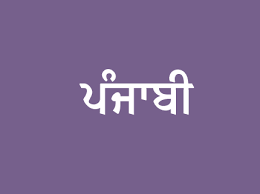Language/Panjabi/Grammar/Nouns
Hi Panjabi learners! 😊
In this lesson, we will learn about Panjabi nouns. We will discover how to identify them, the different types of nouns in Panjabi, their gender, number, and case.
What is a noun?
A noun refers to a person, place, thing, or idea. In Panjabi, a noun is called "ਸਿੱਖ" (sikkh).
Example:
| Panjabi | Pronunciation | English |
|---|---|---|
| ਕਮਲ | kamal | Lotus |
In the example above, "ਕਮਲ" (kamal) is a noun that refers to a type of flower.
Types of Nouns
There are different types of nouns in Panjabi. Here are some examples:
ਵਾਕ || Vak - Common or Countable Nouns
Vak refers to common or countable nouns. These nouns can be singular or plural.
Examples:
- ਗਾਣਾ - Gaana (Song)
- ਕਿਤਾਬ - Kitaab (Book)
When we use a countable noun in a sentence, it takes different forms depending on whether it's in the singular or plural form. This is called "ਵਚਨ" (Vachan) in Panjabi.
Here's an example in the singular and plural form:
- "ਮੈਂ ਕਿਤਾਬ ਪੜਦਾ/ਪੜਦੀ ਹਾਂ ।" (Main kitaab pardaa/pardi haan.) - I am reading a book.
- "ਉਹਨਾਂ ਕਿਤਾਬਾਂ ਨੇ ਉਹਨੂੰ ਬਹੁਤ ਫਾਇਦਾ ਦਿੱਤਾ।" (Unhaan kitaabaan ne unno bahut faidaa dittaa.) - Those books gave them a lot of benefit.
ਅਸਾਧਾਰਣ ਵਾਕ || Asadharn Vak - Proper Nouns
Asadharn Vak refers to proper nouns. These nouns are specific and unique. In general, proper nouns in Panjabi are capitalized.
Examples:
- ਭਾਰਤ - Bharat (India)
- ਕੰਪਿਊਟਰ - Computer
When we use a proper noun in a sentence, it does not take different forms.
Example:
- "ਹਰਮਨ ਸਿੰਘ ਨੇ ਆਪਣੇ ਕੰਪਿਊਟਰ ਦੀ ਮਦਦ ਨਾਲ ਗਾਣਾ ਬਣਾਇਆ।" (Harman Singh ne aapne computer di madad naal gaanaa banaaya.) - Harman Singh made a song with the help of his computer.
ਨਾਇਕ || Naik - Abstract Nouns
Naik refers to abstract nouns. These nouns are intangible and refer to emotions, ideas or concepts.
Examples:
- ਪ੍ਰੀਤ - Preet (Love)
- ਆਪਣਾਪਣਾਂ - Apnapanaan (Belongingness)
When we use an abstract noun in a sentence, it does not take different forms.
Example:
- "ਮੈਂ ਨੇ ਆਪਣੇ ਪ੍ਰੀਤ ਦਾ ਇਜਹਾਰ ਕੀਤਾ।" (Mainne aapne preet da ijhaar kiita.) - I expressed my love.
Gender of Nouns
Nouns in Panjabi also have genders. They can be:
- ਪੁਲਿੰਗ || Puling - Masculine Gender
- ਸਤਰੀੰਗ || Strieng - Feminine Gender
Here are some examples:
| Panjabi | Pronunciation | English |
|---|---|---|
| ਮੁੰਡਾ | Munda | Boy (Masculine) |
| ਕੁੜੀ | Kudi | Girl (Feminine) |
| ਗੁਰੂ | Guru | Guru (Masculine) |
To identify the gender of a noun in Panjabi, we consider its ending. For example, nouns ending with "ਆਂ" (aan) are usually feminine, such as "ਕੁੜੀ" (kudi), which means girl.
Example conversation:
- ਕੀ ਤੁਸੀਂ ਕੁੜੀ ਹੋ? (Kee tusi kudi ho?) - Are you a girl?
- ਜੀ ਹਾਂ, ਮੈਂ ਇੱਕ ਕੁੜੀ ਹਾਂ। (Jee haa, main ik kudi haan.) - Yes, I am a girl.
Number of Nouns
We have already seen that in Panjabi, countable nouns can be singular or plural. Here's more detail:
- ਇਕ || Ik - One
- ਦੋ || Do - Two
- ਤਿੰਨ || Tinn - Three
- ਚਾਰ || Char - Four
- ਪੰਜ || Panj - Five
- ਛੇ || Chhe - Six
- ਸੱਤ || Satt - Seven
- ਅੱਠ || Att - Eight
- ਨੌਂ || Nau - Nine
- ਦਸ || Das - Ten
To make a noun plural, we add suffixes to the noun based on its ending.
Example:
| Singular | Plural |
|---|---|
| ਨਲ | ਨਲਾਂ |
In the example above, "ਨਲ" (nal) is masculine and singular, whereas "ਨਲਾਂ" (nalaan) is its plural form.
In general, masculine nouns that end with a consonant use "ਆਂ" (aan) suffix for the plural form. Feminine nouns that end with a consonant use "ਈਆਂ" (eeaan), and those that end with "ਆ" (aa) use "ਉਂ" (oon).
Example conversation:
- ਰਾਜਾਂ ਦਾ ਘਰ ਕਿੱਥੇ ਹੈ? (Rajaan da ghar kithhe hai?) - Where is the king's palace?
- ਰਾਜਾਂ ਦੇ ਘਰ ਵਿੱਚ ਹੈ। (Rajaan de ghar vich hai.) - It's inside the king's palace.
Cases of Nouns
Cases refer to the different forms a noun can take based on its function in a sentence. In Panjabi, there are ten cases for nouns.
Here are some examples:
| Case | Purpose | Example |
|---|---|---|
| ਇਹ | Nominative | This is a book |
| ਉਸ | Accusative | He read that book |
| ਉਸਨ | Ergative | He gave me a gift |
| ਉਸ | Vocative | Girl, are you learning Hindi? |
Example conversation:
- ਕੀ ਤੁਸੀਂ ਪੰਜਾਬੀ ਸਿੱਖਦੇ ਹੋ? (Kee tusi panjabi sikhde ho?) - Are you learning Panjabi?
- ਜੀ ਹਾਂ, ਮੈਂ ਪੰਜਾਬੀ ਸਿੱਖਦੀ ਹਾਂ। (Jee haa, main panjabi sikhdi haan.) - Yes, I am learning Panjabi.
To improve your Panjabi Grammar, you can also use the Polyglot Club website. Find native speakers and ask them any questions!
Sources
Related Lessons
- Questions
- Future Tense
- Plural
- Give your Opinion
- Negation
- Gender
- Adjectives
- Pronouns
- Conditional Mood

